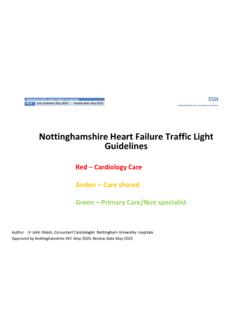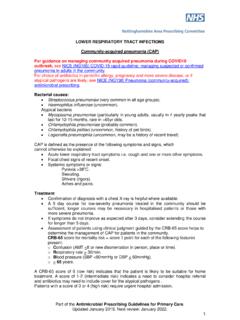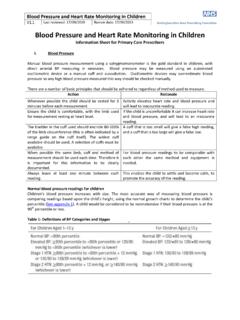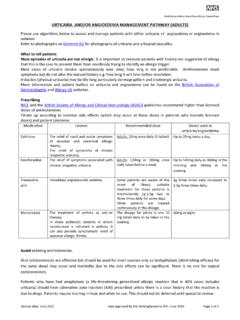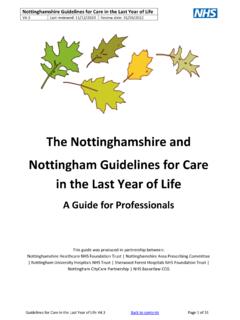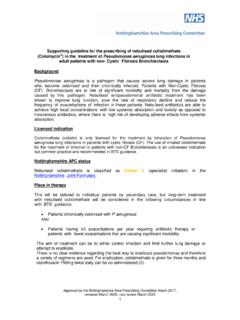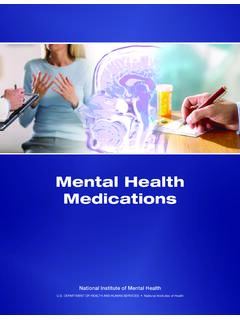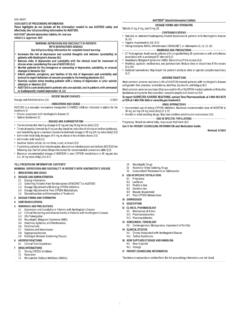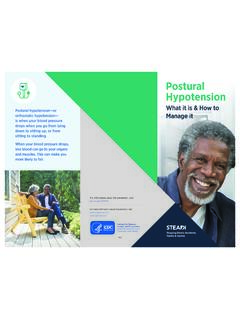Transcription of Primary Care Guide to Antidepressants - NottsAPC
1 Primary Care Guide to Antidepressants Last reviewed: September 2020 Review date: May 2022 1 Primary CARE Guide TO Antidepressants : PRESCRIBING, stopping & SWAPPING Primary Care Guide to Antidepressants Last reviewed: September 2020 Review date: May 2022 2 Nottinghamshire GP Guide to Antidepressants Prescribing, swapping and stopping This document will remain within the confines of the Nottinghamshire Joint Formulary where possible. It will be kept up to date with national guidance and relevant information that has resulted from queries relating to anti-depressant treatment across the interface.
2 A full reference list can be found at the end of the document. Resources used include BAP, BNF, CKS, The Maudsley, Martindale: The Compete Drug Reference & NICE as well as a thorough literature review. NICE guidance on depression is due an update in 2022; some of the suggestions to be made there will be explored in this document. Please do not hesitate to contact me with questions regarding mental health medications, to discuss mental health medications across the interface, or future work you feel would be useful to strengthen prescribing across Primary and secondary care. Hannah Godden| Specialist Mental Health Interface and Efficiencies Pharmacist NHS Nottingham and Nottinghamshire CCG/Nottinghamshire Healthcare NHS Foundation Trust 07880136958 Contents 1.
3 Treatment summary of current NICE Guidance (CG90) 2. Monitoring antidepressant treatment 3. Continuation of Antidepressants and relapse prevention 4. Amending antidepressant treatment 5. Reducing doses and discontinuation symptoms 6. Drug interactions and serotonin syndrome 7. Useful Resources 8. FAQs Appendix One: Table - Information on Antidepressants Appendix Two: Table - Switching Antidepressants Appendix Three: Current Mental Health Efficiencies Projects Treatment summary of current NICE Guidance (CG90) Diagnosis of depression is based on DSM-V criteria (CKS advice). First line treatment for recent onset/mild depression is not medication; rather active monitoring, sleep hygiene, exercise, guided self-help and CBT.
4 Sleep Hygiene Choice and Medication Fact Sheet Insomnia and Sleep Hygiene The charity MIND has a really useful webpage on how to cope with sleep problems. This includes an explanation of sleep and mental health, practical suggestions and where to get support. MIND - how to cope with sleep problems Primary Care Guide to Antidepressants Last reviewed: September 2020 Review date: May 2022 3 Improving Access to Psychological Therapies (IAPT) programme in Nottingham and Nottinghamshire antidepressant treatment Antidepressants are recommended for treatment of moderate or severe depression, subthreshold symptoms present for over 2 years, or mild depression that persists despite other interventions.
5 First line choice of antidepressant is a SSRI. When discussing antidepressant treatment options with a patient, cover the following: Choice of antidepressant Reason for prescribing The gradual development of full antidepressant effect Importance of taking medication as prescribed/the need to continue after remission Potential side effects (see Appendix One) Potential interactions with other medication/physical health problems (see section 6) The risk of discontinuation symptoms (and the most likely symptoms associated with the antidepressant they are prescribed) when they stop the antidepressant (see section 5)
6 Accept both GP referral and self-referral Provides a range of talking therapies, groups and computerised self-help materials Visit the website here for further information on referral and the support on offer Not available in Mansfield and Ashfield or Newark and Sherwood Accept both GP referral and self-referral Provides a range of talking therapies, groups and computerised self-help materials Visit the website here for further information on referral and the support on offer Available across Nottingham, Nottinghamshire and Mid Notts Accept self-referral Provides a range of talking therapies, groups and computerised self-help materials Visit the website here for further information on referral and the support on offer Available across Nottingham and Nottinghamshire Primary Care Guide to Antidepressants Last reviewed: September 2020 Review date: May 2022 4 Monitoring antidepressant treatment When initiating an antidepressant a review period should be discussed with the patient.
7 For those not considered to be at increased risk of suicide: Review after two weeks Review regularly in the first three months ( every 2-4 weeks) Thereafter review at longer intervals if the response is good For those considered to present an increased risk of suicide / are younger than 30 years: Review after one week Review regularly thereafter until the risk is no longer considered clinically important During a review with a patient using Antidepressants the following should be discussed: Tolerability of the medication (directly ask about known side effects that may not be reported- adverse effect on sexual function with SSRIs).
8 Adherence to the medication. Thoughts of hopelessness or suicide; including any specific intent or plans (particularly during the early stage of treatment or treatment changes). The person s depressive symptoms ( response to treatment?) the PHQ-9 (patient completion) or 6-item Hamilton (Bech; clinician completion) are good ways of monitoring change. Any ongoing stresses that may contribute to depression. The impact of any current psychological interventions or the potential benefit of this type of treatment if not undertaken so far. The benefits of exercise and structured activity (where possible) to the outcome of antidepressant treatment.
9 Ask about alcohol and recreational drug use Any hypomanic symptoms If a patient suffers a side effect multiple strategies can be implemented. Symptoms can be monitored closely where side effects are mild and acceptable to the patient or the antidepressant treatment can be stopped and switched to another if the patient prefers. Continuation of antidepressant treatment and relapse prevention The following are current NICE guidelines (CG90): Support and encourage a person who has benefited from taking an antidepressant to continue medication for at least six months after remission of an episode of depression.
10 (This greatly reduces the risk of relapse. Antidepressants are not associated with addiction). Review with the person with depression the need to continue antidepressant treatment beyond six months after remission, taking into account: - The number of previous episodes of depression - The presence of residual symptoms - Risk associated with previous episodes, including suicide, neglect, relationships and work - Concurrent physical health problems and psychosocial difficulties Advise the person with depression to continue Antidepressants for at least two years if they are at higher risk of relapse.
